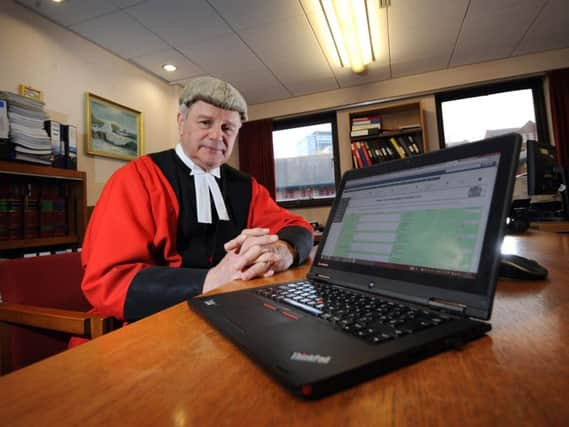'Why television cameras must be allowed to broadcast from Yorkshire's crown courts'


Draft legislation on The Crown Court (Recording and Broadcasting) Order 2020 has been laid down in Parliament and will now be considered by MPs and Peers. If granted it would permit High Court and Senior Circuit judges to be filmed as they hand out sentences in criminal cases.
Former Recorder of Leeds Mr Collier was one of eight High Court judges involved in the pilot of the scheme back in 2016 where sentencing remarks were recorded on a not-for-broadcast basis.
Advertisement
Hide AdAdvertisement
Hide Ad"Personally I think it is a good thing as it giving more people more information about how and why judges reach particular sentences," Mr Collier said.
"It as the potential to be both instructive and informative.
"During the pilot I had no concerns, it was all straight forward and unobtrusive, I am just surprised it has taken so long to get to the stage it is at.
"The important thing people need to understand is that if this is successful filming will only take place in courts where High Court judges are sitting and in the north east that can only happen in Newcastle, Middlesborough, Leeds and Sheffield.
Advertisement
Hide AdAdvertisement
Hide AdMr Collier also spoke of the importance of trusted media covering cases in the interest of transparency and justice.
"We are very fortunate we have The Yorkshire Post who have qualified journalists covering crown court day by day - it is quite a rarity these days for local newspapers to have a dedicated court reporter, " he said.
"In the interest of justice we need the media to produce fair and representable court reports.
Mr Collier's comments have been echoed by The Yorkshire Post Editor James Mitchinson.
Advertisement
Hide AdAdvertisement
Hide AdHe said: "That the Ministry of Justice has taken the decision to broadcast the sentencing remarks of judges in the most serious high-profile criminal cases is a welcome first step in restoring access to the process of law and order for ordinary people.
"That self-same withdrawal of access comes at a time when local and regional newspapers - the medium people actually trust - have been shrinking and closing at a record rate, owing in no small part to the proliferation of digital giants such as Facebook and Google who have tempted large numbers of advertisers away from trusted local media. This has contributed to ever-dwindling numbers of properly trained journalists representing their communities inside court buildings capturing for the benefit of local people the names and addresses of individuals up to no good.
"The net effect of these circumstances is that justice is invisible; people feel isolated and without protection from criminals which in turn makes them feel more and more scared and vulnerable. If we are to restore faith and community confidence in the police and courts, more needs to be done to improve all of our ability to see justice being done in every court in the land."
The Government has said only the judge's sentencing remarks would be filmed and no other court user, for example victims, witnesses, jurors or staff, would be caught on camera.
Advertisement
Hide AdAdvertisement
Hide AdThe move has been welcomed by Yorkshire knife crime campaigner Kayleigh Pepper, whose brother Richard was stabbed to death outside his home in Hull in June 2015.
Mr Pepper's killer Daniel Flatley was convicted of manslaughter after a four-day trial at Hull Crown Court in December 2015 and sentenced to 11 years in jail.
She said: "This would give members of the public the chance to hear first hand what is happening in the interests of justice.
"I believe it would bring to life the devastating consequences families like ours have to live with.
Advertisement
Hide AdAdvertisement
Hide Ad"Bringing crimes to life in this way would be beneficial as it would really make people aware of what really happens in society.
"People think something like this will never happen to them, but it can and it does."
The change in the legislation will allow individual news broadcasters in television and radio to apply to record or broadcast live the sentencing remarks of senior judges presiding over the most serious cases.
In many other countries, broadcasting rules are more relaxed and full court cases are often aired live.
Advertisement
Hide AdAdvertisement
Hide AdThe Criminal Bar Association warned that filming should remain restricted to sentencing remarks only, for fear that vulnerable or reluctant witnesses could be put off from testifying if they thought their evidence was going to be televised.
The Government said that the introduction of cameras in certain high profile criminal trials was "an important first step" and it was possible that cameras might be permitted to film other aspects of the trial process.
